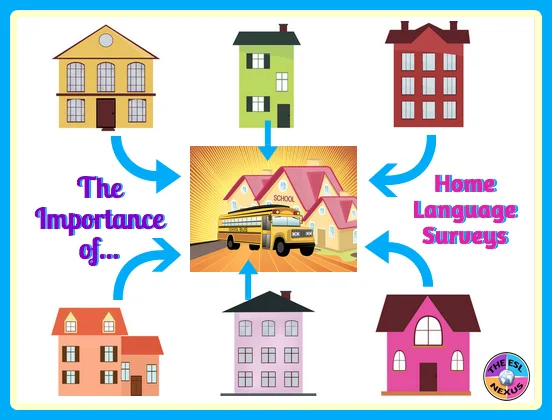To handle a language skillfully is to practice a kind of evocative sorcery.
Charles Baudelaire
Read more at: https://www.brainyquote.com/quotes/keywords/language_8.html?vm=l
Federal law states that school districts must identify children who need support because English is not their first language. To meet this requirement, home language surveys are administered when families register children in a new school district. This toolkit from the U.S. Department of Education offers guidance on administering home language surveys.Read more at: https://www.brainyquote.com/quotes/keywords/language_8.html?vm=l
One would assume that caregivers would be happy to sign their children up for ESL support if English was not their first language so they could get extra help in school, if a test showed that would be beneficial. But that would be an incorrect assumption! As this article shows, parents do not always provide accurate information on home language surveys. There are several reasons why. When I tested newly-registered students to determine their English language proficiency in my former school district, I encountered this situation first-hand.
 |
| It's important to truthfully fill out a home language survey; graphic created by: The ESL Nexus |
Another reason caregivers gave for not wanting their children tested was because they didn't want the students to be pulled out of their regular classroom for an ESL class. Many districts use a pull-out model for ESL instruction so, inevitably, the ELLs would miss whatever was being taught in their regular ed class. It is certainly understandable that parents don't want children to lose out on instructional activities. However, that concern has to be balanced with the fact that ESL lessons will give the children the knowledge and skills to be more successful in their regular classroom. Over the years, it became easier to persuade parents to let their children be tested and to allow them to be placed in the ESL program because teachers made a greater effort to ensure that whatever instructional activity the ELLs missed would be made up at another point during the school day. Mainstream teachers, as they faced classes with more and more ELLs in them, became much more adept at managing the needs of all their students. Doing so has alleviated many parents' concerns.
Some years ago, the teacher of a student in the special education program at my school felt that the boy would benefit from ESL support. Upon looking into the situation, we learned that the mother had refused to have her two children tested for English language proficiency when they enrolled in the district. It turned out that the mother had herself been in an ESL program as a student and had not had a good experience, so she didn't want her own children to go through the same thing. The SPED teacher was able to persuade the mother to give ESL a try and, despite a rocky start, when her son finished middle school, she thanked me profusely for helping him and I am still in touch with the student as he prepares to graduate from high school.
The point I want to make is that educators need to listen closely to caregivers when they say they don't want to have their children tested for English language proficiency. They have valid reasons for their refusal. But we as educators must explain clearly how the advantages of being in an ESL program will benefit students. If pull-out ESL is the only option, then we have to work with regular ed teachers to make sure the ELLs don't miss out on essential classroom instruction. If the parents are basing their decision on their own negative experiences, then we have to describe how our classes will be different.
When educators take the time to really talk with parents about the needs of their children, we can often overcome their resistance. After all, caregivers and teachers all want the same thing: To have their children succeed in school.
